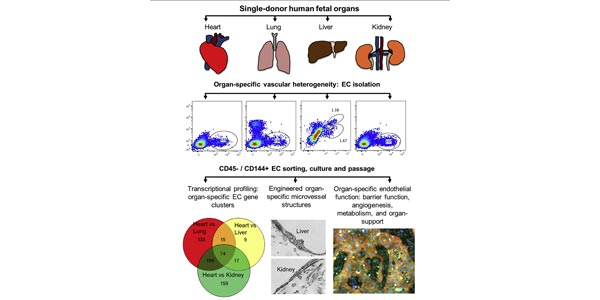Human Organ-Specific Endothelial Cell Heterogeneity.
Raluca Marcu, Yoon Jung Choi, Jun Xue, Chelsea L. Fortin, Yuliang Wang, Ryan J. Nagao, Jin Xu, James W.MacDonald, Theo K. Bammler, Charles E. Murry, Kimberly Muczynski, Kelly R. Stevens, Jonathan Himmelfarb, Stephen M.Schwartz, Ying Zheng,
iScience. Volume 4, 29 June 2018, Pages 20-35.
Abstract
Highlights
- Isolate, culture, and characterize four human organ-specific endothelial cells
- Identify and validate heritable gene expression clusters in human organ-specific ECs
- Uncover the contribution of organ-specific ECs on vascular and organ function
Summary
The endothelium first forms in the blood islands in the extra-embryonic yolk sac and then throughout the embryo to establish circulatory networks that further acquire organ-specific properties during development to support diverse organ functions. Here, we investigated the properties of endothelial cells (ECs), isolated from four human major organs—the heart, lung, liver, and kidneys—in individual fetal tissues at three months’ gestation, at gene expression, and at cellular function levels. We showed that organ-specific ECs have distinct expression patterns of gene clusters, which support their specific organ development and functions. These ECs displayed distinct barrier properties, angiogenic potential, and metabolic rate and support specific organ functions. Our findings showed the link between human EC heterogeneity and organ development and can be exploited therapeutically to contribute in organ regeneration, disease modeling, as well as guiding differentiation of tissue-specific ECs from human pluripotent stem cells.



